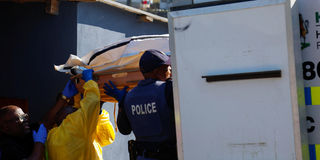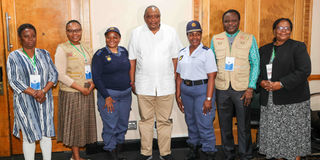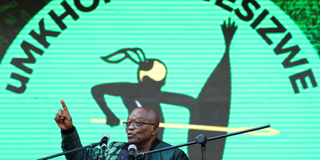
The body of a suspected criminal killed during a police raid is loaded into a mortuary van in Cato Ridge, South Africa on May 16, 2024.
The South African nation is grappling with a series of disturbing incidents of crime and violence in the run-up to this week's elections, which are due to take place on Wednesday.
On Monday, police said they had arrested a suspect in connection with the murders of two members of the uMkhonto Wesizwe (MK) party, a new entrant in the race that has threatened to take a big bite out of the ruling African National Congress's bread.
This development comes at a time when South Africa is already grappling with disruptive protests, as seen in Durban in the KwaZulu-Nala province, where taxi drivers brought traffic on the N2 and N3 to a standstill in protest at the impounding of their vehicles by the police.
The South African Police Service (SAPS) had already sounded the alarm after a raid in KwaZulu-Natal and the Eastern Cape netted 43 licensed firearms from people said to be planning violence.
On the murder suspect, Gauteng police, which covers the larger metropolis of Pretoria and Johannesburg, confirmed that two individuals of the newly-formed MK Party were killed on Sunday night in Katlehong, Ekurhuleni.
The suspect was due to appear in court this week, but police wouldn't say whether his motives were political. However, this incident comes shortly after the arrest of Jossey Buthane, a former member of the African National Congress (ANC) and Economic Freedom Fighters (EFF), on charges of attempted murder following a shooting at a political rally in Juju Valley, Seshego, on May 19.
Tensions escalated in Juju Valley when both the EFF and ANC campaigned in the same area, resulting in a shoot-out that left a 25-year-old man injured as well as a nine-year-old girl with a gunshot wound to the head.
“It is reported the two [MKP] members were shot and killed during a dispute with members affiliated with the ANC at Thwala section,” said police spokesperson Brig Brenda Muridili.
“One victim died at the scene while the other was declared dead on arrival at hospital. One firearm and a knife were recovered at the scene. The motive for the incident will form part of the investigations.”
Despite the various challenges and potential issues leading up to the elections, The National Joint Operational and Intelligence Structure has provided reassurance to citizens that it is effectively managing the situation and maintaining control as the electoral process unfolds.

President of the African National Congress (ANC) Cyril Ramaphosa greets supporters on his arrival at the political party’s final rally ahead of the upcoming election at FNB stadium in Johannesburg, South Africa, May 25, 2024. `
“We are confident we are ready for this next phase,” deputy national police commissioner Lt-Gen Tebello Mosikili said on Sunday.
Meanwhile, in the last three days, the streets of Durban came to a standstill as taxi drivers protested the impounding of taxis by the police, causing major traffic disruptions on the N2 and N3.
There are concerns that the protests may be exploited by political actors to stoke tensions, especially if the election results don't go their way.
These concerns have been amplified by the recent Constitutional Court ruling barring former president Jacob Zuma from serving in parliament despite being allowed to appear on the ballot papers due to his 2021 conviction for contempt of court.
In addition, there were unconfirmed reports of breaches at Electoral Commission of SA (IEC) ballot storage sites in KwaZulu-Natal, Mpumalanga, and the Western Cape.
In a press conference on Sunday, Natjoints said it had put in place an early warning system to detect security risks ahead of the election. The planned truck drivers’ strike, which was set to take place last week, was ultimately cancelled at the eleventh hour due to the intervention of Natjoints and government representatives.
The All-Truck Drivers Forum and Allied SA (ATDF-SA), a local trade union representing truck drivers, had threatened to impede traffic flow until the government acceded to its demands to eliminate foreign nationals from the trucking sector.
“The transport industry is once again urged to hold peaceful talks amongst each other and to find ways of amicably resolving their disputes,” said Natjoints in a statement.

Retired President Uhuru Kenyatta, the head of the African Union Election Observation Mission (AUEOM), met with the National Operational and Intelligent Structure (NATJOINS) led by South African Police Service Major General Mashadi Selepe in Johannesburg last evening. The purpose of the meeting was to discuss security measures for the upcoming May 29 General Elections.
“They are also reminded that the blocking of roads as a way of venting is a criminal offence and law enforcement agencies will act decisively against anyone found to be in contravention of the law.
“Their vehicles will be impounded, and they will be brought before court to answer to crimes committed. No one is above the law and the rule of law will always be applied according to relevant prescripts.”
On the other hand, businesses are preparing for potential unrest before and after the election. An internal memo from FirstRand, a local financial services firm, warned of possible protest action by MKP members in May and June, with a risk of repeating the 2021 unrest.
Those riots in 2021 arose when former President Jacob Zuma was jailed for 15 months for contempt of Court. The government says the violence cost the economy about R50 billion ($2.72 billion). This year, FirstRand identified risks including intimidation, property damage, arson, road blockades, looting, truck hijackings, and political violence.
KwaZulu-Natal is the most at risk, followed by Gauteng and Mpumalanga. The Free State, Northern Cape, North West, and Limpopo were also mentioned as potential hotspots. Fidelity Business Intelligence recently issued a notice highlighting the potential risk of violence in specific regions of the country, particularly in KwaZulu-Natal, Gauteng, Free State, and Mpumalanga.

Former South African President Jacob Zuma speaks to his suppoters during the launch of the election manifesto of his new political party, uMkhonto we Sizwe, ahead of a general election on May 29, at a rally in Soweto, South Africa, May 18, 2024.
Additionally, while some members of the MKP party expressed strong reactions to a recent Constitutional Court ruling, the party as a whole opted for a more cautious and measured response.
“The MK Party acknowledges the Constitutional Court judgment that President Zuma is not eligible to stand as a member of MK Party in the National Assembly,” it said. “This unsurprising decision has not disheartened us. It reinforced our conviction that the current system, where 10 unelected individuals can make lifetime decisions for 62 million people, is flawed.”
In an analysis conducted in April, the Institute for Security Studies highlighted that while the state cannot afford to ignore the threats of violence, it seems to be responding to them with greater seriousness compared to its approach in 2021.
South African highways are generally crime-prone. There have been over 200 reported cases of foreign truck drivers being murdered in South Africa in recent years. This has led to foreign truckers associations filing a complaint at the International Criminal Court (ICC) in The Hague, Netherlands. The ICC said it is actively monitoring the situation of foreign drivers in SA.





